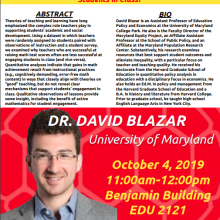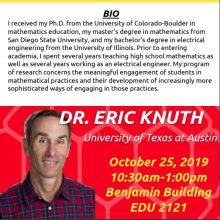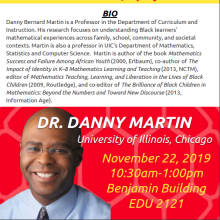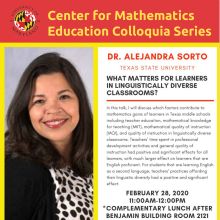Previous Colloquium Series
September 30, 2016
Reed Stevens
"Mathematics does not have an image problem, it has an association problem: Improving mathematics learning by breaking problematic associations and establishing productive new ones"
October 28, 2016
Mark Ashcraft
Math Anxiety
November 18, 2016
Tad Watanabe
Lesson Study
February 3, 2017
Kai Rands
Mathematical Inqueery
February 24, 2017
Edd Taylor
Relationships between youths’ everyday cultural practices and mathematical thinking
March 31, 2017
Jacqueline
September 29, 2017
Dana Grosser-Clarkson
Elizabeth Fleming
Daniel Levin
University of Maryland
October 27, 2017
TAKING STEPS TOWARD THINKING ABOUT DATA IN THE CLASSROOM
Victor Lee
Utah State University
More Information
November 17, 2017
WE REAL COOL: A PHENOMENOLOGY OF MATHEMATICS REMEDIATION
Gregory Larnell
University of Illinois at Chicago
More information
January 26, 2018
Ilana Horn
Vanderbilt University
More Information
February 23, 2018
Mitch Nathan
University of Wisconsin-Madison
March 30, 2018
Robert Berry
University of Virginia
April 27, 2018-Cancelled
Miriam Sherin
Northwestern University
May 11, 2018
Mariana Levin
Western Michigan University
September 28, 2018
Toya Frank
George Mason University
October 26, 2018
Tarcia Hubert
Lone Star College
November 30, 2018
Laura Van Zoest
Western Michigan University
February 22, 2019
Ebony McGee
Vanderbilt University
March 29, 2019
Melissa Gresalfi
Vanderbilt University
April 26, 2019
Martha Alibali
Universityof Wisconsin-Madison
September 25, 2020
Gloriana Gonzalez
October 23, 2020
Brian Lawler
December 11, 2020
Karisma Morton
January 22, 2021
Zandra de Araujo
February 26, 2021
Caro Williams-Pierce
March 26, 2021
Kari Kokka
April 23, 2021
Michelle Peters
May 28, 2021
Chris Rasmussen
Speakers
|
February 25, 2022 Dr. Nathan Alexander, Morehouse College
Nathan Alexander, PhD, is an Assistant Professor of Data Science in the Division of Mathematics and Computational Sciences at Morehouse College in Atlanta, Georgia. At Morehouse, he directs the Quantitative Histories Workshop, an interdisciplinary teaching and learning lab for students, faculty, and community members in the Atlanta University Center (AUC). His current work examines the role of culture and history in the development of critical pedagogies for undergraduate mathematics and statistics. He completed his PhD in mathematics and education at Teachers College, Columbia University, a masters degree in teaching mathematics at New York University, and he double majored in mathematics and sociology at the University of North Carolina at Chapel Hill. Dr. Alexander can be reached at nathan.alexander@morehouse.edu, on Twitter @professornaite, or at professornaite.com. |
|
March 18, 2022 Dr. Julie Amador, University of Idaho
Dr. Julie Amador is an associate professor of elementary/middle school mathematics education, in the College of Education's Department of Curriculum and Instruction. Her research focuses on the design and enactment of mathematics lessons with an emphasis on student thinking and reasoning as related to professional noticing. She is specifically interested in how practicing and pre-service teachers construct models of student mathematical thinking based on professional noticing and engage in Lesson Study. From her faculty profile online |
|
April 8, 2022 Dr. Christopher Jett, University of Georgia
Dr. Christopher C. Jett is Professor of Mathematics Education in the Department of Computing and Mathematics at the University of West Georgia. His research examines African American male students’ mathematical and racialized experiences. He received an NSF CAREER award, the 2019 Association of Mathematics Teacher Educators (AMTE) Early Career Award, and a 2019 Presidential Early Career Award for Scientists and Engineers (PECASE). His scholarship has been published in the Journal for Research in Mathematics Education, Investigations in Mathematics Learning, and the Journal of Higher Education. Additionally, he is co-editor of Critical Race Theory in Mathematics Education (Routledge, 2019). From his online profile |
|
April 15, 2022 Dr. Elizabeth van Es, University of California-Irvine
Dr. van Es is interested in teacher thinking and learning and the design of pre-service teacher education and professional development. Her research is primarily concerned with how to support teachers' developing their noticing practices for ambitious and responsive instructional practice. Much of her work uses video to help teachers develop a vision of ambitious instructional practice and to learn to attend to student thinking during instruction. She has recently expanded her research to examine teachers' noticing for equity, focusing on how teachers' commitments to equity inform their noticing and instructional practice. She is launching a new study with the support from the National Science Foundation to develop a model of professional development that brings together secondary mathematics teachers, youth, and community leaders to advance teachers' noticing for equity in teaching. In addition, building on her research on pre-service teacher education, she received funding from the University of California Office of the President with colleagues at various University of California campuses to develop a data base that will study the influence of pre-service teacher preparation on beginning teaching practice. This study will take an improvement science approach to develop measures for assessing pre-service teacher effectiveness. From her online profile |
|
April 29, 2022 Dr. Niral Shah, University of Washington
Niral Shah is an associate professor of the Learning Sciences & Human Development, and is director of the Race, Theory, & Design Lab. His research concerns how people learn racism and anti-racism. Shah’s prior work has focused on race and racism in STEM education, specifically how racial narratives about STEM ability affect students’ identities and participation in classrooms. He is also a co-developer of the EQUIP classroom observation tool (https://www.equip.ninja/), which supports teachers and educational leaders to identify and mitigate implicit bias in classrooms. |
|
May 6, 2022 Dr. Jonee Wilson, North Carolina University Dr. Jonee Wilson, a former high school mathematics teacher for Baltimore County Public Schools, is an assistant professor of mathematics education in the Department of Teacher Education and Learning Sciences at North Carolina State University. Dr. Wilson earned her PhD in Mathematics Education at Vanderbilt University. Upon completing her PhD, she secured funding from NSF for a post-doctoral position to support her in developing the Equity and Access Rubrics for Mathematics Instruction, which is a set of rubrics designed to assess the extent to which teachers are implementing practices that support increased participation and achievement particularly among African American students. From her profile online. |



